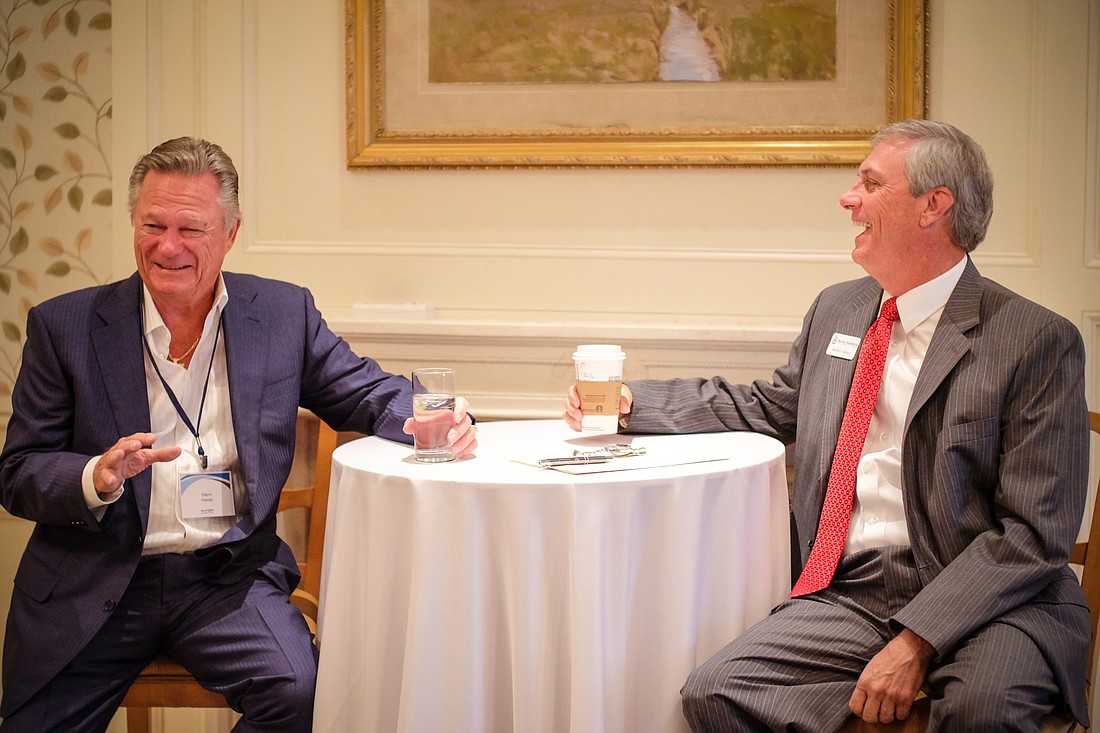- July 26, 2024
-
-
Loading

Loading

When Glenn Hasse was a young entrepreneur, he learned a valuable lesson in leadership from his company’s production line foreman.
The foreman dropped a length of chain on Hasse’s desk. Pushing the chain with his finger made the chain crumple. Pulling it kept it straight. “This is leadership,” the foreman told his boss, Hasse. “You don’t push anybody.”
The lesson? You can’t force people to do anything. “It doesn’t work,” Hasse recently told a crowd of more than 200 people who gathered in Naples for a recent NextGen Speaker Series event.
It’s one of the early lessons Hasse learned as he built Lakeville, Minn.-based Ryt-way Industries into the largest food-blending and packaging company in the U.S. until he sold it to a Chicago private equity firm 2008. Starting with a $3,000 investment, the company grew to package widely recognizable products such as Hamburger Helper and Splenda.
Hasse’s speech was the latest from The NextGen Speaker Series, a popular event organized by Naples wealth consulting firm Benson Blackburn. Past speakers include Best Buy Founder Richard Schulze; Arthrex Founder and CEO Reinhold Schmieding; former Johnsonville Sausage CEO Ralph Stayer; former Caterpillar CEO Don Fites; former Walmart Stores President and CEO Michael Duke; and former McDonald’s USA President Jan Fields.
‘I had many bosses: my customers, my banker, the government.’ Glenn Hasse, Ryt-way Industries
Now retired and living in Naples, Hasse, in his presentation, recalled some key lessons he learned that helped him grow Ryt-way Industries to $800 million in annual sales with 600 employees. The lessons include:
• Lead by example: Hasse says growing up on farms in Minnesota meant no job was too small, and everyone pitched in. His father “never asked anyone to do a job he wouldn’t do,” Hasse recalls.
• Always be learning: Hasse learned about running a profitable business as a child, when his parents bought a drive-in restaurant and managed farms. That’s where he learned what items had higher profit margins.
• Share profits: After the production foreman showed Hasse his lesson in leadership using a chain, the entrepreneur launched a profit-sharing program at Ryt-way in which the employees received 15% of the company’s annual profits. When he sold the company in 2008, he insisted the buyer continue the profit-sharing program as part of the deal.
• Clock out: Hasse says he never called employees after they clocked out for the day or the weekend. “When they left at the end of the day I didn’t bother them,” he says. He acknowledges that became harder when cellphones and emails became ubiquitous, but he never intruded on employees’ family time. “You have to work on that,” he says. “The weekend is for the family,” he adds, noting the plant never ran on Sundays.
• Reward dependability: Hasse says he prized loyalty with his company. Even if an employee was a little slower than the others, loyalty was more important to him. In return, Hasse says he instituted a “family first” culture that gave employees time off for important family matters.
• Ride the waves: Hasse recognized changing trends, or what he calls “waves.” For example, the packaging industry boomed when consumers wanted the convenience of packaged foods, such as Hamburger Helper, and when food companies contracted out manufacturing.
• You have many bosses: Being an entrepreneur doesn’t necessarily mean you’re your own boss. “I had many bosses,” Hasse says, “my customers, my banker, the government.”
• Customers will help you grow: When Hasse needed to buy new packaging equipment, his customers often helped finance the purchase because they knew Ryt-way could get the job done properly. He never turned to private investors — “more bosses,” he says.